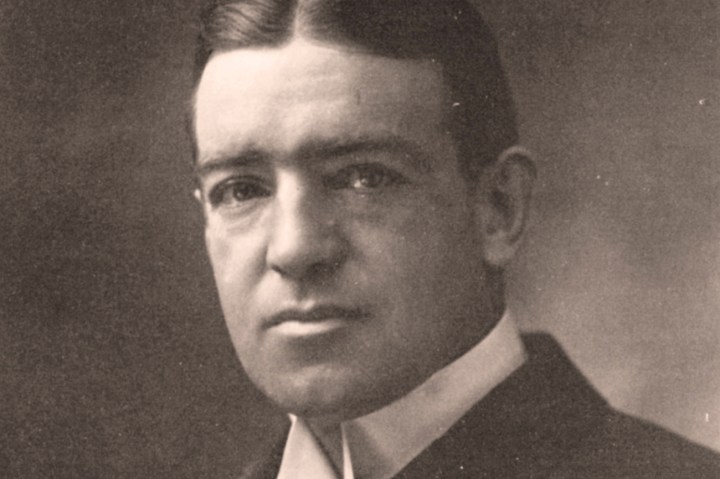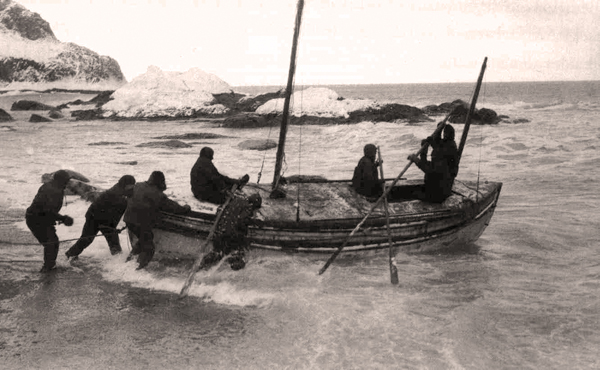Sci-Tech
Shackleton – still the greatest after all these years

Ernest Shackleton was a previous generation’s Steve Jobs – flawed, a failure, but also a remarkable success. There are those that still swear by his leadership style, and consider him a model. That’s both a good thing, and a really, really bad thing. By RICHARD POPLAK.
If you happened to find yourself in Gollel, Swaziland, in 1922, the man behind the only bar in town would have left an impression. His skin was scarlet from the elements, his eyes fiery, his demeanour uneven. His name, if you cared to ask for it, was Frank Wild. His story, if you got that far, linked South Africa with a man now considered one of the greatest explorers, and finest leaders, of all time.
We are talking here of Ernest Shackleton, the Anglo-Irishman who tore his way through the South Pole when there was still something left on the planet to explore. Wild was known as his right-hand man, the fellow he relied upon most, and his second-in-command when he needed one. Wild died in Braamfontein, Johannesburg in 1939, and was last year interred in a small plot alongside his great friend and mentor, in the whaling station of Grytviken on South Georgia Island. He died broke, drunk and ornery – just the way an explorer should.
But had he opened up to you in Gollel, the tale he would have told was worth ten thousand sea biscuits and a gallon of grog. The “Boss”, as they called him, Shackleton himself, was a remarkable man. He possessed three of the most important qualities that aided those hoping to make a name for themselves in the age of exploration: ambition, curiosity and an unfailing ability to raise hull-loads of money, no matter how absurd the cause.
And face it, in our age – the age of un-exploration – what Shackleton, Wild and their ilk accomplished can seem completely unreasonable and utterly unnecessary. Had they just waited a couple of decades, they could have flown in with a glass of champagne in hand. But this, of course, is to miss the point. Shackleton, more than most, embodies something essential about what it means to be human. He needed to do the undoable.
He started doing it meaningfully at the outset of the Heroic Age of Antarctic Exploration, which coincided with the decline of the British Empire, and in retrospect is a poignant example of a nation – a culture – trying at all costs to hang on to an image of themselves that was fading into history.
Shackleton was born Irish in 1874, his family moving to London after his father had trained as a doctor in Edinburgh. He was an unenthusiastic student, and was apprenticing on a sailing vessel by the time he was 16. By 1898, he was qualified as a Master Mariner, set to command a British ship anywhere in the world. He was a strange personality for a sailor – erudite, certainly, but also somewhat of a loner. He drew people in by the strength of a personality that wasn’t forceful, but singular.
He was also bored. Or, rather, incredibly ambitious. And the place for an ambitious young seafarer at the turn of the previous century was the Antarctic. He prevailed upon the father of an acquaintance – a backer of the National Antarctic Expedition, Britain’s version of Nasa at the time – to bring him into the fold. This is how he managed a berth on the Discovery, under the aegis of the legendary Commander Robert Falcon Scott, Bill Gates to Shackleton’s Steve Jobs.

Photo: Nimrod Expedition – Wild, Shackleton, Marshall and Adams. (Wikimedia Commons)
The comparison may be a stretch, but the record will show that the men were viewed not so much as distinct personalities, but as distinct models of leadership. From the moment they met, Scott and Shackleton were, in a gentlemanly manner, sizing each other up. Historians have been doing the same ever since. Scott was more the nineteenth century aristocrat, meticulously planning his expeditions, and very successful for doing so. But it must also be noted that the first man to reach both the North and the South Poles, the insanely intrepid Roald Amundsen, did so with the sort of fly by night immediacy that Malcolm Gladwell would endorse. But despite his achievements, which were unprecedented and incredible, he does not have the cache that Shackleton does.
And that’s because he was never on the Discovery. Leaving in 1901, no human beings had made it further south than Scott, Shackleton and scientist Edward Wilson. The Discovery’s, um, discoveries were multitudinous, but it is the march from McMurdo Sound, when all 22 of the sledging dogs perished, that lives on in legend. Shackleton was lucky to make it back alive. Scott returned looking like he had gone out for his morning constitutional.
That humiliation, if you wish to call it that, drove the remainder of Shackleton’s career. He was immensely popular among his men, mostly because he was one of the first 20th century men – he was uninterested in class, and obsessed with ability. He’d size a fellow up in an instant, and would ignore background as a prerequisite for employment. He behaved like a captain of industry, so when the chips were down – and boy, were the chips down – he was able to depend on his men, and by extension, himself.

Photo: Launching the James Caird from the shore of Elephant Island, 24 April 1916. (Wikimedia commons)
After the expedition, he worked the lecture circuit and failed horrendously as a businessman – something he would do for his entire life. Then came the Nimrod, an expedition he raised the funds for and undertook between 1907 and 1909. On the Great Southern Journey, as Frank Wild dubbed it, Shackleton and his small team were stopped only 180 miles from the Pole. Near dead from starvation, they were lucky to make it back to the ship. Nonetheless, their exploits secured Shackleton’s legend.
No story in the history of exploration, however, comes close to what happened during the Imperial Trans-Antarctic Expedition (1914-1917). Unfolding during World War I, the era that cemented the decline of the British Empire, Shackleton commandeered the Endurance into the maw of southern cold. Famously, the ship became trapped, consumed by the elements, crushed by the ice. With war raging, there was little chance of a rescue operation. This didn’t stop the crew from spending two brutal winters huddled under rowboats, on a diet of red meat and cuttlefish. When it was clear that their lives rested in their own hands, Shackleton resolved to go north to save his men and his expedition. (Though not necessarily in that order.) They rigged one of the rowboats with a mast and a sail. Naming the craft after a benefactor, James Caird, Shackleton and four of his men set out to save the crew, left behind under the watch of Frank Wild. In seas that defy description, they made it to South Georgia, 800km away, and crossed the entire island in order to reach the whaling station – a feat that was not matched in over 40 years. The crew of the Endurance was saved, to a man.
Shackleton, like most men of his kind, attempted that one final job. It’s a Hollywood cliché that is a cliché for a reason. Bored to death of the lecture circuit, and in debt to the tune of what would be millions of today’s rands, he made up a reason for one final southern expedition. He commandeered the Quest to South Georgia, and on 5 January 1922, died from massive heart failure. His wife sent notice for him to be buried there.
Lest we think of this as a hagiography, it should be stated here that in almost every way, Shackleton was a failure. He bombed business after business. He was not the first to reach the South Pole. He flaked out on Scott. He was, in later life, a drunk of immense proportions. But he has, over the years, become a model leader. It’s a mistake, a reduction, to think of him thus. He was an incredible but flawed human being who was alive and active at a particular historical moment. His greatest asset was his ambition, which translated as will. He was able to inspire other men to join him.
That said, if you would like a taste of what he accomplished, try make it to Grytviken to see his grave. I was kidding when I said you could fly there with a glass of champagne in hand. Try two sleeping pills and a flask of Scotch. That should do the trick. DM
Main photo: Ernest Shackleton (Wikipedia)




 Become an Insider
Become an Insider